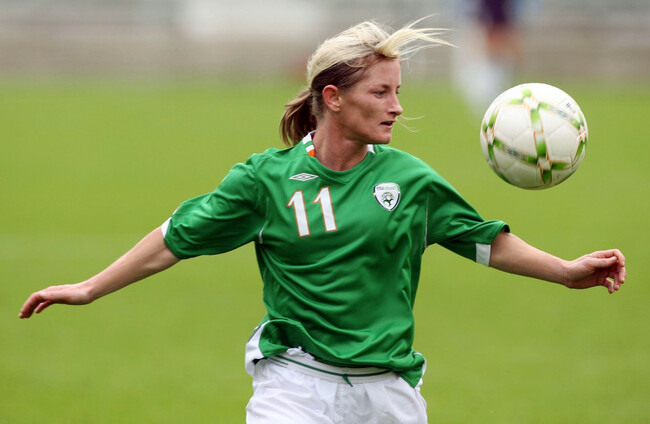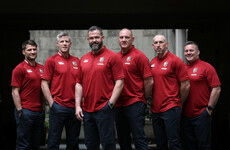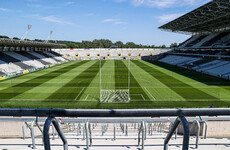OLIVIA O’TOOLE IS widely considered one of the greatest footballers Ireland has ever produced.
Until Robbie Keane surpassed her to score 68 times, O’Toole was Ireland’s all-time top goalscorer at international level with 54 goals and over 100 caps between 1991 and 2009.
Now 48, she works as a recreation officer with Dublin City Council in addition to coaching at St Catherine’s, while she retains a keen interest in football at all levels.
During the week, just prior to the start of the Women’s World Cup, The42 caught up with the legendary player to discuss a wide range of issues, including her background in soccer, the various obstacles she had to overcome and the current state of the women’s game.
Your dad was a big influence in cultivating your love of football I believe?
Yeah, my Dad got me into it. Saturday night, Match of the Day, watching George Best. I was born in ’71, so I just saw repeats of him, but my dad always said George Best was the best player in the world, so I grew up with George Best, following United. My idol growing up was Bryan Robson, centre midfield or left, because that’s where I played with Ireland. Then after that was Giggsy. And after that was Ronaldo. All United players.
That drive and determination to thrive in football. Did that come from your parents, and particularly your dad, and wanting to please them?
Not to please them. I was handed a ball on my sixth birthday and I just constantly had it in my hand. When I was six years old, there was no football, no underage. I only started playing underage. My dad and all my family came out to matches. I started playing with Sheriff Street Boys first. I then proceeded onto the girls, but the drive for me was that I was passionate about it. The way Katie [Taylor]‘s passionate about her boxing at the moment, I was passionate about my football. The only thing is I’d love to be 20 years younger starting off now [laughs].
Where did that passion come from?
I’m not throwing roses at myself — I had a natural ability, I knew it and I worked on it. I grew up playing street football. I was a winner. I wanted to win everything. I was a very bad loser. That’s why I prolonged my career for so long — I just didn’t want to stop.
Did many other members of your family play soccer?
My dad played for local teams. I played for Raheny United and my sister played for Rathfarnham United. She didn’t go as far as I did. My brothers had potential. But where we were from, growing up in Sheriff Street in the ’80s, wasn’t a happy place at the time, with the heroin and all coming into the street. A lot of my friends and family were caught up in that. I looked at them and said: ‘I don’t want this life.’ I went off, did my own thing and just stuck to football.
If I didn’t have a football, I’d be in a completely different place to where I am today. It was the ’80s. I was 13 or 14. I was growing up seeing all these people taking heroin and dying from it. I just didn’t want that sort of life, so my football was my getaway.
Football saved you?
It saved my life, yeah.
Do you think one of the main reasons for drug addiction is people simply thinking they have no viable alternative in life?
Yeah. As you know, Sheriff Street has a bad name. But the people in it are beautiful. There were at least 20-30 people in Sheriff Street that could have made it in football and I seen them go on the wrong path. My friends — some of them are dead from drugs, some of them are still alive taking drugs, 20-25 years later.
It has to be up to yourself — not anyone else to take your hand and say: ‘You need to get out of this environment and do it yourself.’ It was tough growing up, but it was also a happy place as well. I only seen what I wanted to see — playing football, going to school, playing football, going to school, that’s all I did.
I played for an U11 boys’ team in Sheriff. Basically, I was idle from seven years old to about 10. You don’t really see anything — you just want to play. From 11-15, all I saw was football, school and bed.
From 15-16, I went to Drumcondra Ladies, because they had a problem with me playing with the boys. I actually changed that rule. It came up to the appeals court and everything. They changed the rule from girls playing to U17 today with boys.
It just happened to me [as a result of one] match, I was after injuring a fella, he was putting his head up to me, my manager came over and [said]: ‘She’s a girl.’ And they were all like: ‘What?’ That’s where they put the appeal in — that one incident.
I was like: ‘Ma, why aren’t they letting me play football?’ And she couldn’t explain it. So my manager explained it, I played the last three games [of the season] with them and the following year, I went to Drumcondra Ladies team when I was only 16. There was no underage kids then at clubs in Ireland. I was the youngest on the seniors. It was a bit daunting, but it could have been King Kong playing — I’d have played in anything, because that’s all I wanted to do.
Did it take you long to adapt to senior level at 16?
The girls football was only coming up. There was only one league in Dublin and about six or seven teams — Rathfarnham, Benfica, Raheny, St Catherine’s, Belvedere. We competed like that for about 15 years. There were no other leagues, whereas in every province now, there are leagues.
You took two years out of the game when you were a young player. Why?
I got fed up with it. I was pissed off with it. I wasn’t enjoying going to matches and training. I said to myself: ‘I need a break.’ I went back to Drumcondra Ladies and then I went to Raheny, because Drumcondra Ladies fell apart.
It was just a period of my life where I was fed up with everything. I don’t know what was happening at the time.
I just said I couldn’t be bothered, but when I left, I missed it terribly.
What convinced you to come back?
I heard about the Irish team. I didn’t even know they existed for women. And I was asked to go for trials. I went out to the AUL out in Santry — 500 girls for the weekend whittled down to 23. We went to the Euro [qualifiers] after that, the following year. Our first game was against Spain. We won 1-0 and I scored the winner on my debut.
Were you working at this time and was it difficult to balance with football?
I didn’t start working until my late 20s. I was working with Dublin City Council and fair play to them, they gave me every single day off [for playing football] with pay. I was playing for my country and it’s a government policy to pay anyone doing anything for their country.
Some girls didn’t get paid — they had to take annual leave. At the start, I had to take annual leave. I only came to an arrangement with them, because Ireland were starting to come up, and we were going to tournaments for 3-4 weeks. I had to sit down with my employers and ask them could I do that. They were very grateful and I really appreciate that. [If they weren't] I would have been getting paid for two days’ work every week.
But in that sense, you were one of the lucky few in the Irish team?
Big time. I roomed with Sharon Boyle. Sharon had to take annual leave. I roomed with her for 12 years — I’m getting paid and she’s not. It was just at the discretion of the employer.
I’d imagine that contributed to a lot of tension within the camp and ultimately disappointing performances?
It’s the last thing you want to be worried about when you’re playing for your country. Speaking to your boss and asking for days off with pay, and he’s saying: ‘No you can’t.’ Yet you’re not even getting paid for playing for your country — not even a taxi fare. We got absolutely nothing — representing your country and that was it.
If I had seven hours, I’d be able to fill you in on the shite we put up with.
What are your standout moments at international level?
The best moment was my debut, scoring in front of 7,000 supporters and one person there with an Irish flag. It was comical when you think about it.
Another time, we were playing in Richmond Park against Croatia. It was 1-1. We needed to win to go through to the [qualification] group stages. That’s all we ever fought for — not even to get out of the group to go to the World Cup. Stephanie Curtis crossed the ball, I took it on the chest, on the volley, and I put it in the back of the net in Richmond Park.
We [also] went out in America and there were 22,000 people cheering. I’d never experienced anything like that.
One thing that really sticks out that annoys me is the play-off against Iceland [in a Euro 2009 play-off]. We played them in Richmond Park and drew 1-1. We played them away and we played on a fucking ice rink. I mean a fucking ice rink. I went to Noel King, the Irish manager at the time and said: ‘There’s no way that we can play on this.’ He said: ‘Olivia, the only way this match will be called off is if one of youse go down and split your head open.’ I was like; ‘What?’
They annihilated us. They were used to it. I couldn’t get a grip on my boots or nothing. And they beat us 3-0. That was a big disappointment. The match shouldn’t have been played. Every one of us thought that. I even went over to the referee [and said as much] and she just shrugged her shoulders.
The downside as well is the travel. One trip we went to Moscow. We were on a straight road for at least nine hours. The Russians were giving us travel to get to a match the next day, making us tired, tactics and everything. When they got off the plane here, they’re 10 minutes away from the pitch. We should have bleedin’ played them in Cork or something. They always did it, and Belarus, any of those countries [in Eastern Europe] made us travel far.
We’re getting onto a plane at 6.30am, getting to Russia during the day, we’re getting nine hours on a bus, getting into the hotel at one, we’re training the next morning and the match is the next day — Thursday, Friday, Saturday, home.
There was one incident where [a representative of the FAI] says: ‘You have to give me your jersey.’ I said I’d give it to a German player I was playing against, because he’s not going to ask her for it. I got a bollocking over it, for fucking swapping a jersey.
The [Irish] boys would go to a five-star hotel, we’d go to a two. The boys get tracksuits from Nike, we’d get tracksuits from Puma. It’s never on the same level — never was and never will be. All this about women being equal is brilliant, but in football in Ireland, they’ll never be equal. The wrong people are running it. We didn’t build on the World Cup quarter-final that the boys got through to [in 1990]. The girls getting so close [to qualifying], they didn’t build on it.
It annoys me, because there’s so much potential in Ireland. All we have is passion. When we play with passion, we win things. Playing against Holland [in the last qualification campaign], it was: ‘Great result, 2-0.’ You don’t celebrate a defeat, just because they’re European champions. You strive to be like them. They’re getting a pat on the back. I’d be like: ‘We should have won this game.’
Are you optimistic that a new-look FAI can bring about genuine change?
John Delaney’s done an awful lot for women’s football behind close doors. He did an awful lot for Shamrock Rovers when we were going for the Champions League qualifiers for the first time. He is good in the background, but whatever is going on in there, it’s obviously not good for our football, so there does need to be a big revamp.
They’re too long there and set in their ways. You need someone who wants to do it from the roots up, instead of doing it from the roots of England up. You start with your own. I could see Niall Quinn coming in, getting his own people in and people would actually probably end up going to watch the League of Ireland games. They don’t.
We were playing against Switzerland in a European qualifier in Richmond Park. A representative comes in with posters a day before the game. I said: ‘What the fuck are we supposed to do with that?’ She said: ‘I’m only after getting them?’ I said: ‘What do you want us to do, go around the street the day of the game putting up posters?’ This is where the lack of professionalism is. That should have been advertised five weeks before on radio, TV and with posters all over the place. And maybe we’d have got at least 200 people at the game instead of just our families. Nobody knew about it, it wasn’t advertised.
Do you think there’s been considerable progress with regards the national team on account of the better conditions and recent record-breaking attendance at Tallaght?
It’s brilliant, but it’s well overdue. They’re taking too long to do stuff. I played in Richmond, Tolka and Shamrock Rovers. It was only 10 years ago and there were still only our families at the game.
In the English league, they’re pumping money into it and they can do the same with the girls’ league here. They won’t, because they have to look after the boys’ teams. If money was pumped into it and they were professional, we’d be a top-class team, because we have the players.
Can Ireland qualify for a major tournament soon, do you think?
We have Katie [McCabe] at Arsenal, Leanne [Kiernan] at West Ham. Players are being brought up in the English league where money is pumped into it. Our girls [in the Women's National League] are still going to work [in jobs outside of football]. As long as we stay amateur, we’ll never win anything.
I really believe if we were [fully] professional — the men and women’s leagues, we’d be a top team [at international level]. It would get more popular. People would be following Shels and Bohs, and not Man United and Liverpool. It should have happened [in 1990], when we went to the World Cup. You have to build on success.
You had a very successful career at club level, winning eight FAI Cups and nine league titles. What are the standout memories in that regard?
Shamrock Rovers against Shelbourne at Iveagh Grounds. We beat them for the LFAI Cup. It was 2-2 and we won on penos. You know why it sticks out? Because there were supporters there — it was advertised and known about four or five weeks before. I asked the FAI for posters and went around myself and put them up. There were loads there and it was only the Iveagh Grounds. This is why advertising is a big thing and the FAI don’t build on it.
The turnout has been poor enough for most recent Women’s FAI Cup finals, right?
I was there the year before, I think it was Shelbourne and Wexford Youths. I went in and sat down and I’d say there were about 200 people there. But yet, the men were able to come on to the pitch at half-time and warm-up and ruin the pitch, go off the pitch and then the girls came back on. I was like: ‘Who lets that happen?’ It’s an FAI Cup final and they’re letting the men train on it at half-time.
Who do you fancy to win the World Cup?
France or England. The Netherlands? I don’t think so. But they have some top players. Then there are new teams coming into it as well. Everyone’s raving about Nigeria. They have a player who plays up front for Barcelona. I was looking at them on YouTube, they are very good. Australia and Canada [look impressive too].
How are you adapting to life after football?
When I retired from the Irish team, I continued playing up until the age of 41, just for St Catherine’s. My brain is 20, but my body is forty fuckin’ eight.
I’m after playing an Ireland Legends game, that was last weekend in Shannon Town. Ronnie Whelan, Ray Houghton, Stephen Hunt, they all played in it. It was a great honour actually. And I was fuckin’ dying after it, I was in bits. 45 minutes I played and [it felt like] 45 hours. But you just don’t want to stop. You just want your body to stay calm.
Imagine having the opportunities that the girls have now. Unbelievable opportunities. If I got that opportunity when I was young, I could have went with Emma Byrne and Ciara to Arsenal. But I didn’t want to work in laundry, washing their first-team stuff. You were leaving home basically for £13o a week. And working in Arsenal laundry, playing for Arsenal was your privilege.
So you essentially would have had to make a massive sacrifice?
Yeah, a massive sacrifice to go and play for Arsenal. The privilege was, they were saying, that you were playing for Arsenal. It doesn’t matter whether you’re washing boots or cleaning jerseys. But I wasn’t [going to be] working in a laundry just to be associated with Arsenal. So I didn’t go.
It shows the real lack of respect towards female players back then, doesn’t it?
The young players are there now in the academy getting well looked after. Now, it’s grand [for others] to wash the laundry. But at the time, no. Arsenal were only starting off, they were one of the top teams in England. Then Ciara and Yvonne [Tracy] went. Yvonne came home, then she went back over. They made a great career from it.
To me, it’s like taking the city out of the person and the person out of the city. Ciara was coming from Waterford and Emma was coming Leixlip. I reckon if I was coming from Waterford, I’d have jumped at the chance. Whereas I was in ‘The Big Smoke,’ I had everything around me.
What advice would you give to young girls and boys who hope to forge a career in the game?
I was talking to a few girls down in Shannon at the weekend. The majority of them were going to the Gaynor Cup. They were all 14 or 15. When I was growing up, it wasn’t called the Gaynor Cup at the time, but I said: ‘This is where you get looked at. Where the FAI coaches are and the Premier League coaches, so you have to go into this tournament [with that in mind], but the most important thing is to enjoy it. If you don’t enjoy it, you won’t enjoy your football.’
I said: ‘The opportunity you have around now, we hadn’t got this [when we were] growing up. If we had these opportunities, we wouldn’t be speaking to youse now.’
There was a 16-year-old, I said to her: ‘If you’re any good and there’s a scout watching, you could be playing for Manchester City next year.’ That is the reality of it now. If you’re in any way good — City, Liverpool, United, they pick you up. It’s going to be like with the men, how the Citys and Uniteds used to come over here to Home Farm and St Kevin’s Boys and rob all our boys. It’s going to be same with the girls now — they’ll be wanted by the top teams.
It’s an absolute brilliant time to be a woman’s footballer today with the opportunities they have. The facilities, the technical aspect, the nutrition. I didn’t know what a nutritionist was 10 years ago.
And young girls also have a number of people to look up to, who are actually doing it, like Irish internationals Louise Quinn and Katie McCabe.
Louise was a top, top player. I always said: ‘Lou, what are you going to do?’ She said: ‘I don’t know.’ I said: ‘You need to get out of here.’ I told her to get out of Peamount, because I knew she was good enough for the likes of City or Arsenal.
If you see a girl and you know she’s good enough, you have to tell them. They don’t believe in themselves. An awful lot of girls have low self-esteem. You give them that little pep talk and it works miracles for them.
I’d encourage any child from the ages of 12-16 to stick with it and be passionate about it, because there’s a living in it now.
This interview has been edited and condensed for publication.
The42 is on Instagram! Tap the button below on your phone to follow us!

















Pity it’s nearly over. It was brilliant.
These games were fantastic. Helped me forget about the doom and gloom for a bit over the last two weeks. Loved the swimming,the track events& cycling Bolt and Co were amazing. And of course our own team did a great job. Hopefully it will inspire kids out there and bring pride back to this country.
I really enjoyed the games! Thought after the amazing opening ceremony everything that followed would be a let down but by god I was wrong! Absolutely loved watching the sports, some of which I had never seen before! London did good, it has to be said! And well done and congrats to all who flew the flag for Ireland! Ye all did us proud!(“,)
Great two weeks of entertainment and a chance to forget the doom and gloom. Just shows what a bit of success can do for our national sense of well being. We really needed the lift. Hope it’s not spoilt by petty wrangling over money and unnecessary interference by politicians. Best moments were of course Katie Taylor and the boxers and other great performances by Annalise Murphy, Cian O Connor, Rob Heffernan and Gavin Noble. A sport I had never seen before was the dressage and I found it fascinating. Horses can dance! Amazing!
Sweden playing France in the Handball not the Volleyball !
Two sports we do not Care about either way! Volleyball is only good if played on a beach by cute women ;)
What about the boxing officials sent hope and Russia saying boxing is fixed ???
And let’s not forget the thousands of Irish fans that made it over to London for the games, who otherwise might not have been able to go if it was halfway across the world, it probably is the closest we will ever have to a HOME GAMES so that has been fantastic, London should be proud of the games they have put on.